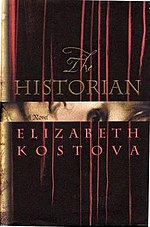Title: The Historian
Author: Elizabeth Kostova
Year: 2005
Genre: Fiction/Mystery/Thriller
Rating: 2
If we're sick of vampires, that's only because we've got a reason to be, after Twilight and "True Blood" and the absolute cultural obsession with the occult. But every once in awhile, there's an intellectual who focuses on the subject, because underneath all the pop culture, it is an interesting one.
Elizabeth Kostova's debut novel The Historian preceded the undead craze by a few years, and took a very intellectual, analytical approach to the legend of Dracula. Bram Stoker originally handled the 15th century Romanian myth in his 19th century novel, but Kostova reimagines the story with a gracious amount of research and historical context. The novel is wide-spanning, painting a picture of two different worlds-- tense Cold War Europe and the tenser 15th century Ottoman takeover.
Although it takes awhile to fall into the structure of this novel, it soon flows easily between your fingers, like intertwined threads. The story follows a young woman (who remains unnamed throughout the book) as she gradually discovers her father's deep research on Vlad Tepes, better known as Vlad the Impaler, better known as Dracula. Her father, Paul, haltingly tells her the flashbacks to 1954 of his unfortunate adviser at a New York university, Bartolomeo Rossi, who started him on this road before disappearing without a trace. From there, Paul meets a young Romanian woman named Helen who accompanies him in his search for the undead, legendarily cruel Dracula. Their road takes them across Eastern Europe, from Istanbul to Budapest and and back, and the truth becomes darker and more bloody with the more they discover.
The chapters of Paul's tale are interspersed with the tale of his daughter, who becomes caught up in his research on the Transylvanian vampire, and the occasional document or letter from Paul or Rossi. The novel is broken up into three parts, but there are no real cliffhangers or time jumps separating the parts, which is reminiscent more of a term paper than a novel.
Mrs. Kostova, an American, has certainly done her research. The novel is the work of ten years of her life, and her meticulous writing and composition shows in the style and gravity. Each of the places mentioned is real enough to touch; one can almost feel the sun in Istanbul, hear the voices of the singers in Bulgaria, and feel the wind off of the ominous Lake Snagov. She mentions dozens of scholarly papers and works on Dracula in as many languages, some of which are lost or fragmented. The dedication of the novel relates that Mrs. Kostova first gained interest in the character from the tales that her father told her of the Eastern European legends of the undead.
The novel could easily have been a hundred more pages. There is a lot of material here, and despite the 642-page length, it feels condensed. At the beginning, we're eased into the background, like lowering oneself slowly into hot bathwater, but toward the end, all of the important plot points happen in the space of about twenty pages. It's actually fairly disappointing. The whole novel is a great story, with so much to interest, and whole cultures that have been shut off to us by the Iron Curtain for years. Kostova does not sidle around the issue of language-- she includes snippets of Hungarian, Turkish, Bulgarian, German, French, and Romanian, making an almost cheeky point about the state of American linguistics (as the old joke goes, what do you call someone who speaks one language?). Fortunately, she smoothly provides translation that makes sense for us, and the novel never comes unglued with unexplained mysteries.
Oh, wait. The only mystery she doesn't touch is how Dracula became undead in the first place.
To a degree, it's the novelist's job to delve into mysteries and secrets that have been close-guarded, but in this case, it seems more respectful than anything. She's created a whole tale around a foggy legend, and it only seems fair that she leave one mystery to keep the original tale interesting and gripping to future generations.
The book largely sticks to its story without too much philosophizing, but she can't help but stray into the realm of deep thought at the end, when a character poses the question of good versus evil. Good is not perfectible, but evil is, so why not strive for the thing that you can make perfect? Temptation, darkness, reason, and inner conflict... it all concatenates in this one line, a tear in the neat fabric of the mystery before returning to the plotline. It shows an admirable amount of restraint-- this book alone could merit a term paper on the essence of life, death, evil, cruelty, et cetera, but Mrs. Kostova's primary goal is to tell the story. Like the great novelists, she leaves it to us to draw our own conclusions from what she's written.
After all, she is only the historian.
This fabulously dark work is available on the Kindle for $9.99, or from barnesandnoble.com for $6.28. I had to wait a long time to get it from my library because a lot of people want to read it, so I would advise buying it, because it's worth a couple of reads.

No comments:
Post a Comment